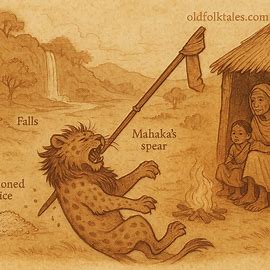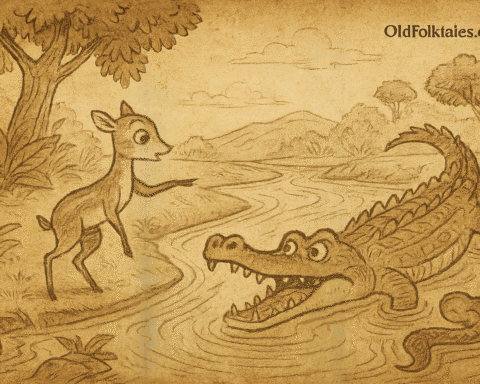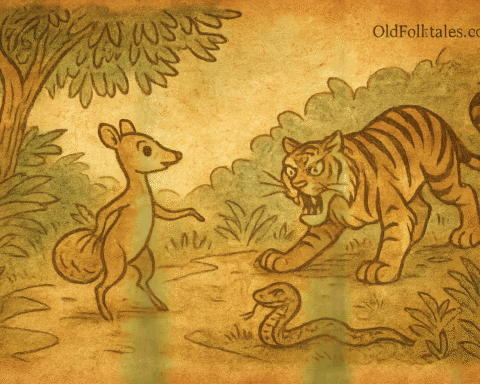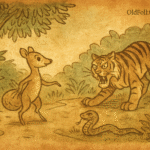In the highlands of Madagascar, where the terraced rice fields glitter under the sun and rivers wind their way through the valleys, two names stirred both fear and awe: Kotofetsy and Mahaka. Known far and wide as tricksters without equal, they lived by deceit, surviving on the misfortunes of others. Yet, for all their cleverness, the end of their tale would reveal that betrayal turns inward, and patience often claims the final victory.
One quiet afternoon, Kotofetsy and Mahaka came upon an old woman and her young son fishing along a riverbank. The child tugged at his mother’s hand, urging her to return home. “Let us go, Mother,” he pleaded. “We have enough. I am tired.”
But the mother, determined to fill her basket with more eels, shook her head. “Patience, my child. We must wait until the catch is good enough.”
The boy’s words proved prophetic, for before they could leave, Kotofetsy and Mahaka appeared. With sly grins, the rogues seized the old woman and her son.
“From this day forth,” Mahaka declared, “you belong to us. You are our slaves.”
The boy wept bitterly. “Oh Mother, if only you had listened to me when I asked to go home!”
“Be patient,” the mother answered, her voice steady despite her fear. “Wait until the end, my child.”
Seeds of Betrayal
The tricksters led their captives away. After a long walk, they stopped at a clearing, where Mahaka leaned close to Kotofetsy and whispered, “These eels will not satisfy us. Let us find more food.”
But in truth, Mahaka’s mind burned with treachery. He plotted to kill Kotofetsy and claim the captives for himself.
The two men bound the old woman’s hands and gave her son rice to cook. Then they left together to fish again. Yet Mahaka’s plan did not unfold as smoothly as he imagined.
Not long after, Kotofetsy returned alone. He went straight to the cooking fire, his eyes scanning the pot. “Where is Mahaka’s share of the rice?” he demanded.
The old woman, resigned to her fate, pointed silently to the bowl. Kotofetsy drew a vial from his pouch and poured a deadly poison into the rice. With cold satisfaction, he murmured, “Now you belong only to me.”
The boy cried, but his mother placed her hand gently on his shoulder. “Patience,” she whispered. “Wait until the end.”
The Spear and the Poison
Suddenly, Mahaka appeared at the doorway. His eyes flashed with suspicion and malice. Without a word, he raised his spear and drove it deep into Kotofetsy. The trickster fell lifeless to the ground.
Mahaka turned to the trembling woman and her son. “Now you belong to me,” he declared, his voice hard as iron. Fearful for their lives, they nodded in submission.
When the rice was ready, the old woman set a portion before Mahaka. Hungry and victorious, he dug in greedily. Yet no sooner had he swallowed than his face twisted with pain.
“Water!” he gasped, clutching his throat. “Bring me water!”
But the poison Kotofetsy had hidden in the rice was already coursing through his body. His voice cracked, his limbs trembled, and before long, Mahaka collapsed, choking and writhing until at last he lay still beside his fallen companion.
The Triumph of Patience
The old woman and her son stood in stunned silence. Before them lay the two men who had tormented so many with lies and cruelty. Their cunning, once sharper than blades, had turned inward and destroyed them both.
The mother looked at her son, who was still trembling from the ordeal. Her voice, calm and firm, carried a final lesson: “Did I not tell you, my child, that it is best to wait until the end?”
So it was that Kotofetsy and Mahaka, the scourge of many villages, met their downfall, not at the hands of warriors or kings, but through betrayal, poisoned rice, and the quiet patience of an old woman who endured until the end.
Moral Lesson
This tale teaches that betrayal often destroys the betrayer. Kotofetsy and Mahaka, masters of deception, turned their tricks upon each other, and their greed led them to ruin. Their deaths remind us that cunning without loyalty is self-defeating.
At the same time, the old woman embodies the power of patience. While her son despaired, she urged him to wait. Her steady endurance saw her through suffering until fate itself delivered justice. The story warns us that in life, evil may appear powerful for a time, but patience and integrity prevail in the end.
Knowledge Check
Who were Kotofetsy and Mahaka?
They were legendary tricksters from the Merina people of Madagascar.
What were the old woman and her son doing when the tricksters appeared?
They were fishing for eels by the river.
What plan did Mahaka secretly form against Kotofetsy?
He plotted to kill him and claim the captives for himself.
How did Kotofetsy attempt to betray Mahaka?
By poisoning Mahaka’s share of rice.
How did Mahaka kill Kotofetsy?
He thrust a spear into him without hesitation.
What lesson does the mother teach her son at the end?
That it is best to wait until the end, for patience reveals true justice.
Source: Merina folktale, Madagascar.






